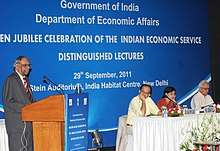Indian Economic Service
The Indian Economic Service (Hindi: भारतीय आर्थिक सेवा) (abbreviated as IES, I.E.S.) is the administrative inter-ministerial[2] and inter-departmental civil service under Group A[3] of the Central Civil Services of the executive branch of the Government of India. The unique aspect of the service is that the cadre posts are spread across various departments and ministries of central government numbering more than 55. It is a highly specialised and professional service within the government of India catering to economic analysis and policy advice.[4]
 | |
| Service Overview | |
|---|---|
| Abbreviation | I.E.S. |
| Formed | 1961 |
| Country | |
| Civil Service academy | Institute of Economic Growth, Delhi |
| Controlling authority | Department of Economic Affairs (Economic Division), Ministry of Finance |
| Legal personality | Governmental: Government service |
| General nature | Economic Analysis, Economic Administration |
| Cadre Size | 477 (2015)[1] |
| Service Chief | |
| Chief Economic Adviser to Government of India | K Subramaniam |
| Head of the Civil Services | |
| Cabinet Secretary | Rajiv Gauba |
History

The Indian Economic Service was introduced by Prime Minister Jawaharlal Nehru[2] for formulating and implementing economic policies and programmes in India. The initial steps towards formation of service can be traced to 1952.[2] A Committee under V. T. Krishnamachari submitted a report in September 1953, recommending the formation of a service to be known as the Statistical and Economic Advisory Service.[2] On the contrary, Prasanta Mahalanobis did not favour the idea of a combined Statistical and Economic Advisory Service.[2]
The Cabinet in its meeting held on 12 February 1958 decided that two separate services should be formed; a Statistical Service and other an Economic Service.[2] The Indian Economic Service was constituted on 1 November 1961 and the Service Rules were notified on the same date. The actual operationalization of service took place in 1964.[2]
Until 2009, the post of Chief Economic Advisor to the Government of India was a Union Public Service Commission appointment and until the 1970s almost all CEAs were members of the Indian Economic Service.
Recruitment
_probationers_calls_on_the_Union_Minister_for_Finance%2C_Corporate_Affairs_and_Information_%26_Broadcasting%2C_Shri_Arun_Jaitley%2C_in_New_Delhi_on_April_09%2C_2015.jpg)
The UPSC conducts a separate Economics Service exam. The minimum eligibility criteria is a post graduate degree in Economics and allied subjects.[5]
Various Grades in the IES
| Grade | Strength |
|---|---|
| Higher Administrative Grade + (HAG +)/ Principal Adviser (Apex) | 5 |
| Higher Administrative Grade (HAG)/ Senior Economic Adviser/ Senior Adviser | 15 |
| Senior Administrative Grade (SAG)/ Economic Adviser/ Adviser | 89 |
| Junior Administrative Grade (JAG)/ Joint Director/ Deputy Economic Adviser {including Non-Functional Selection Grade (NFSG)/ Director/ Additional Economic Adviser} |
148 |
| Senior Time Scale (STS)/ Deputy Director/ Assistant Economic Adviser/ Senior Research Officer | 114 |
| Junior Time Scale (JTS)/ Assistant Director/ Research Officer | 107 |
| Reserves | 40 |
| Total authorised strength | 518 |
Training
The direct recruits undergo a comprehensive probationary training comprising various phases ranging from Foundation Course (along with All India Services and Central Civil Services) to Applied Economics at the Institute of Economic Growth (IEG). The training programme also comprises various attachments with institutions of repute all across the country. The training course also has international attachment with Civil Service College, Singapore.[6]
Notable members
- I. G. Patel – 14th Governor of Reserve Bank of India[7][8]
- Manmohan Singh - Economic Advisor, Ministry of Foreign Trade, India (1971–1972)[lower-alpha 1]
- Montek Singh Ahluwalia - Economic Adviser in the Ministry of Finance (1979)[lower-alpha 2]
- P. N. Dhar - Economic Adviser in Prime Minister's Secretariat (1970)[lower-alpha 3][9]
- Samar Ranjan Sen – Former Executive Director of the World Bank for India, Bangladesh and Sri Lanka.[10][11]
- R. M. Honavar – 6th Chief Economic Adviser to Government of India[12]
- R.K. Chandolia - Private Secretary to Andimuthu Raja and accused in 2G spectrum case[13][14][15]
References
- "Final Seniority List of IES officers: Ministry of Finance, Government of India" (PDF). Indian Economic Service. Retrieved 23 December 2016.
- "History of the Indian Economic Service". Indian Economic Service. Archived from the original on 6 September 2016. Retrieved 23 December 2016.
- "Complete Civil Service Schedule of the Civil Services Group A of India" Archived 4 March 2016 at the Wayback Machine. Civil Service Group A – Government of India 1 January 2011.
- "About IES".
- "IES - UPSC" (PDF).
- "Probationary Training" (PDF).
- "Modi and economics". Business Standard. Retrieved 23 December 2016.
- "Obituary: Dr I.G. Patel". Financial Times. Retrieved 23 December 2016.
- "The Night of the Long Knives". The Telegraph. Retrieved 26 August 2019.
- "Samar Ranjan Sen dead". The Hindu. Retrieved 7 June 2017.
- "Noted economist Samar Sen dead". Rediff.com. Retrieved 7 June 2017.
- "From deficits to dividends". Business Line. Retrieved 12 December 2018.
- Hussain, Yasir. Corruption Free India: Fight to Finish. readworthy, 2012. ISBN 9789380297248.
- "Transfer/Posting of SAG officer of IES" (PDF). Indian Economic Service. Retrieved 22 August 2019.
- "2G scam: A Raja, Siddharth Behura & R K Chandolia are core sector of conspiracy, says CBI". Retrieved 22 August 2019.
Notes
- Manmohan Singh was appointed as a lateral entry to the civil services. The post and rank of Economic Advisor is only present in Indian Economic Service cadre.
- Montek Singh Ahluwalia was appointed as a lateral entry to the civil services. The post and rank of Economic Advisor is only present in Indian Economic Service cadre.
- Professor Dhar was appointed as a lateral entry to the civil services. The post and rank of Economic Advisor is only present in Indian Economic Service cadre.